HIS YOUTH
Benito Amilcare Andrea Mussolini was the son of a socialist, while he was in Switzerland from 1902 to 1904, he wrote for socialist periodicals such as “L’avvenire del Lavoratore” (the worker’s future). In 1912 he then became the editor of the socialist journal “Avanti!” (forward!), that at the time was considered to be THE newspaper of the Italian Socialist Party. He was later expelled when demonstrating support for the war, contrary of what Italian socialists believed.
Some historians view him more as an “Authoritarian revolutionary than an orthodox marxist”, in fact when World War I started, he decided to leave behind the Marxist ideology to enter the world of Nationalism and militarism; he understood that he could get finance by industrialists to spread word about entering the war, and so he did, gaining supporters and hatred by the other socialists, who were beginning to view him as an extremist.
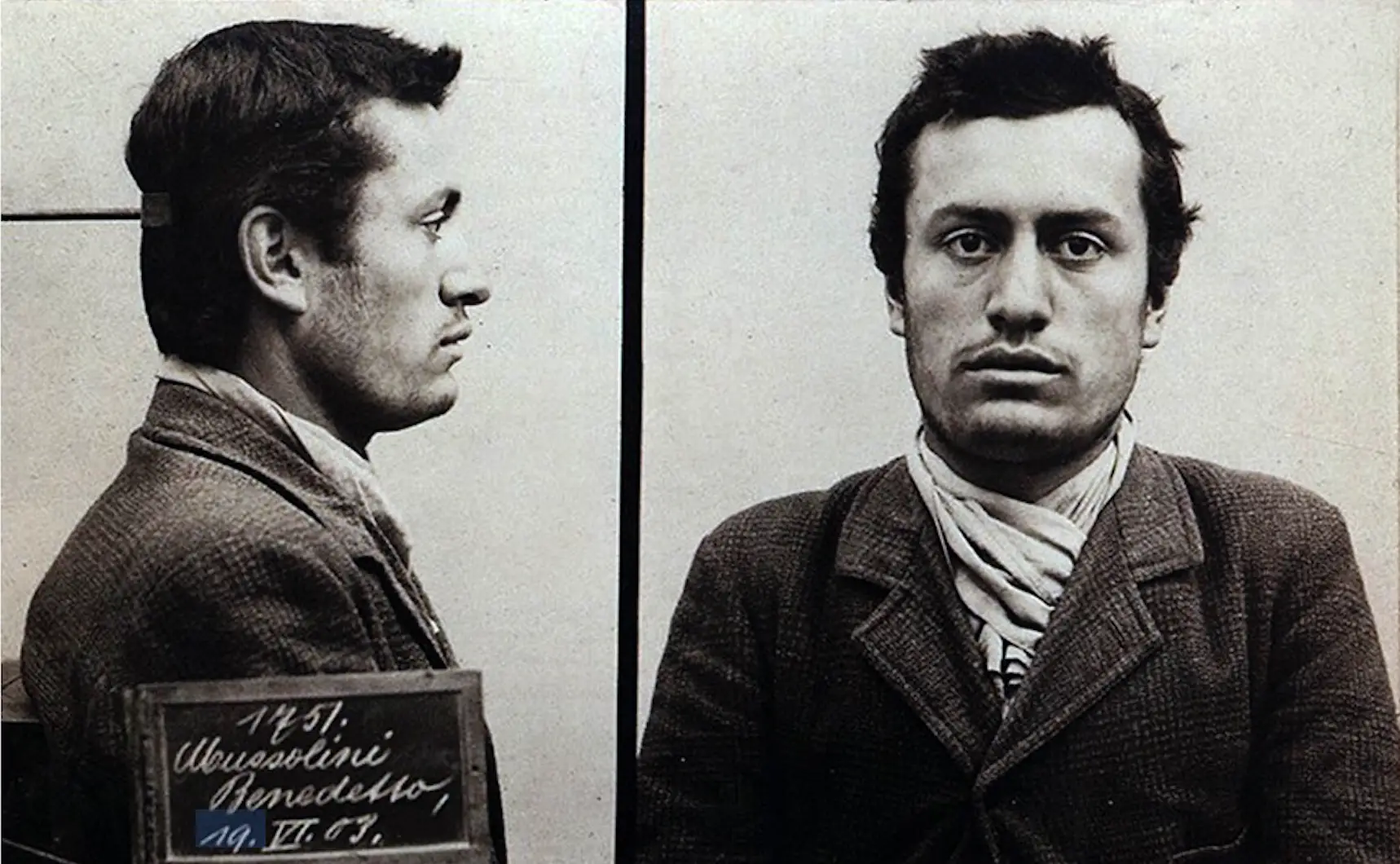
Mugshot of Benito Mussolini after he got arrested by the Swiss police
THE START
When Mussolini graduated, in 1901, he started to work as an elementary school teacher, but soon got in trouble and had to leave Italy for Switzerland, where he found safe harbor in Lausanne.
Here he worked at lots of jobs, from being a carpenter to a butcher. It was in this time that he started to explore the world of Marxism, helped by Angelica Balabanoff, a well known Russian agitator.
He later returned to Italy in 1904, when an amnesty was declared thanks to the birth of the King’s son. When he returned, he maturated his own idea of socialism, helped by the fact that he knew lots of people and had the occasion to explore various ideologies. He was against the moderate and reformist socialism of Filippo Turati. Mussolini thinks that the real enemy is “capital”, and he identifies it in the military and priests. A few years pass by and he finds himself teaching in a village in Liguria; here he actively writes for the local socialist newspaper, signing his articles with the nickname “The real heretic”.
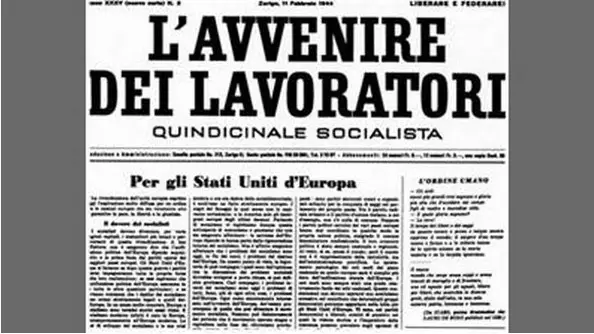
L’avvenire del lavoratore, one of the newspapers for which Mussolini worked
BEFORE THE WAR ON LIBYA
In 1909 Mussolini transfers to Trento, where he works for the local “Chamber of work”. Here he writes for “L’avvenire del Lavoratore” (The worker’s future), and even cooperates with “Popolo” (people) of Cesare Battisti. In october of the same year he decides to return home to his father, whom has now remarried after the death of his wife. It’s here that Mussolini starts having a relationship with one of the daughters of the woman that his father married. Her name was Rachele. The couple lived in a small apartment in Forlì, maintained by the 125 lire that the socialist federation sent to Mussolini every month for his work.
Is in this period that he founds the newspaper: “La lotta di classe” (The class struggle), with which he attacks constantly the Italian bourgeoisie. In 1910 he finds himself attending the Italian socialist congress in Milan, where his line is considered to be too ultra-revolutionary, so he and his companions decide to detach from the Party.
In the summer of 1911, with the War on Libya starting, Mussolini decided, along with the other socialists, to protest against it, and for this he was arrested and condemned to 2 years in prison, later reduced to 1.
After he got out, he decided to prepare another Socialist congress, that opened on the 7th of July.
In just 2 years, he became one of the most prominent faces of the Socialist party, in fact his radical thesis, his peremptory complaints all go towards the bases of delegates that weren’t happy at how the party was conducted. The War on Libya had revealed itself as a war that was too much costly in terms of human resources, and many feared uprisings in the Country. Its in this situation that Mussolini emerges as a charismatic leader, capable of uniting the masses, he’s the one that manages to cut off from the direction of the party all the members that were too much reformists, with the so called “maximalists” taking power. It’s in this time that at Mussolini was granted the direction of the “Avanti!” (Forward!), the official newspaper of the Italian socialist party.
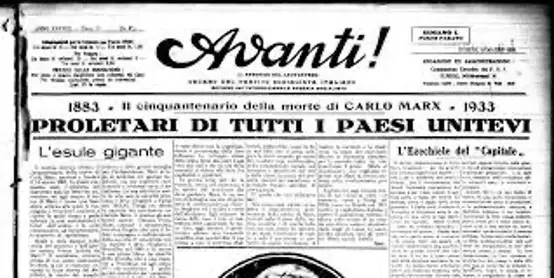
Front page of “Avanti!” for which Mussolini worked as director
WW1
When the war started in Europe, Mussolini was still the director of the “Avanti!”, and in the columns he wrote that Italy should maintain its “absolute neutrality”. The problem was elsewhere, in fact the other socialist parties of Europe all wanted the war, that they thought was right.
It didn’t take long to convince Mussolini, and soon he started writing about the necessity of a political turn (going from absolute neutrality to active and operating neutrality. But the socialists didn’t like it and so pressured him into leaving the direction of the newspaper.
But Mussolini decided not to remain with his hands in his pockets, and so he founded another newspaper, called “Il popolo d’Italia” (The people of Italy), declaring it socialist and interventionist.
Not too long after, on the 24th of November, he’s expelled from the Italian socialist Party, not without heated controversy.
At the start of 1915, Him and other revolutionary trade unionists decide to found the “Fasci d’azione rivoluzionaria”.
On the 31st of August 1915 Mussolini was called to arms and sent on the High-Isonzo Front. He never saw too much action, first he went to the hospital to cure paratyphoid fever, then he was wounded when a mortar exploded next to him, almost costing his life. He never went back to the front.
When he was discharged from the hospital, he resumed the direction of his newspaper. After the end of the war, his newspaper became the mirror of what was happening inside Italy, in fact he now addresses the veterans, that were eager to see all the promised made to them fulfilled. They were also angry at how the Conference in Paris treated them.
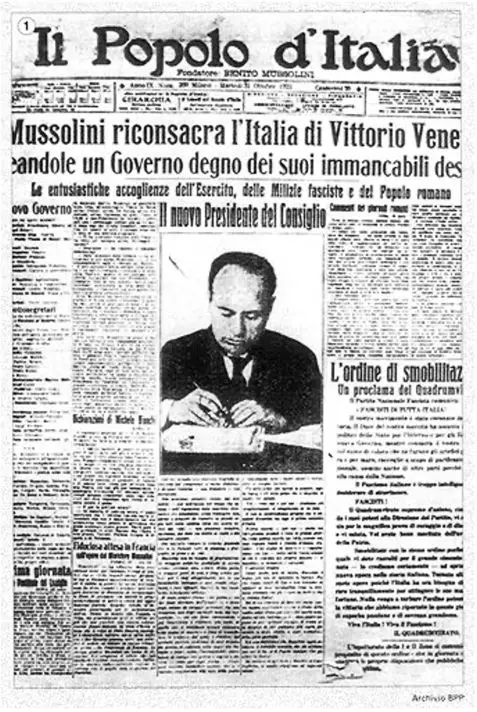
Front page of “Il popolo d’Italia” with a photo of Mussolini
AFTER THE WAR
On the 23rd of March 1919 in San Sepolcro Square in Milan, Mussolini and other founded the “Fasci di combattimento”, but they didn’t undergo new memberships. It’s during this time that some fascist squadrons start to attack the editorial staff of the “Avanti!”. The nation is now divided between two poles: Nationalism with D’Annunzio and Fascism with Mussolini, but at the general elections, the fascist movement didn’t gain any single seat.
During 1920, fascist squadronism gets more intense, with the squads openly attacking socialist workers and using all kind of intimidations against them; land owners use them to keep workers under control in the farmlands.
THE ITALIAN SOCIAL REPUBLIC
When Mussolini’s government fell on the 25th of July 1943, he was imprisoned on the “Gran Sasso”, where he was freed by the Fallschirmjager. He was then flown to Milan where he established this muppet state, called “The Salò republic”.
This state was created by Hitler to serve as a shield against Allied troops. It comprehended territories of the north and central part of Italy, including Rome.
It was led by Mussolini and his reformed anti-monarchist Republican fascist Party. They recovered the old Declaration of San Sepolcro of 1919, with which Mussolini founded the “Fasci di combattimento”. With this republic he hoped to return to the old values of his, and he tried making increasingly populist appeals to the working class, claiming to regret many choices that he and the government made. In practice, little to nothing resulted from his declaration, in fact many industrialists were opposed to changes and the labour force reacted with a massive strike on the 1st of March 1944.
This socialist dream of Mussolini didn’t last long, in fact his forces were little to no successful against Allied forces without German support, and soon this muppet state was reduced to almost nothing, with Mussolini himself trying to flee to Germany, but instead he got captured and later executed.
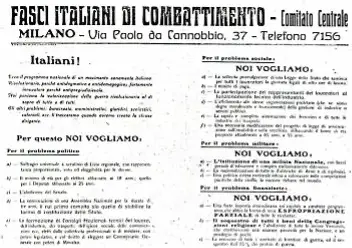
The San Sepolcro Program
CONCLUSION
At first Mussolini was truly a socialist, he believed in a cause that he thought was right, read almost everything he could about this cause, went all or nothing for it, but in the end he drifted away from the true socialism and embraced a different kind, more revolutionary, thus creating fascism.
When he rose to power, he knew that socialists and many other would try and strip him of his power, but he acted quickly and banned every political party except fascism, thus entering the dictatorship period.
When his fascist dictatorship ended over all Italy and the socialist republic period started, he thought of turning back to his old days, in fact he even called some of his old socialist comrades to help him control and manage this new state, but the time was not right and resources were scarce, plus the ongoing allied advance altered or stopped some of his plans.
In the end, we can say that Mussolini tried creating something different from socialism, and he did, although it wasn’t what some people in Italy or the world hoped for. During the time of the socialist republic, many wanted to tell him that what he was trying to do wasn’t going to bring back socialism as it was, but they were too afraid.
Wrapping things up, we can say that he was, indeed, a socialist, but his views were too strong and revolutionary for his time.
SOURCES:
“Pro e contro: Mussolini – I dossier Mondadori” by Mondadori 1972
